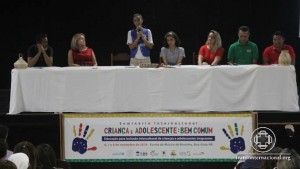 Fraternidade – International Humanitarian Federation (FIHF), together with UNICEF (United Nations Children’s Fund) and other organizations, will present the “Letter on Education in Emergency in Roraima” to the public powers of the state of Roraima. It is a set of proposals for the improvement of education, both of the immigrants and of the Brazilians themselves.
Fraternidade – International Humanitarian Federation (FIHF), together with UNICEF (United Nations Children’s Fund) and other organizations, will present the “Letter on Education in Emergency in Roraima” to the public powers of the state of Roraima. It is a set of proposals for the improvement of education, both of the immigrants and of the Brazilians themselves.
The recommendations were gathered during an international seminar that the Federation and UNICEF organized in the city of Boa Vista, Roraima’s capital, between November 6 and 8, 2018, in the context of Humanitarian Roraima Mission.
The initiative has the objective of sensitizing the concerned instances for public policies to embody adequate inclusion mechanisms of immigrant children and adolescents to the formal educational system of Brazil, taking into account the International Norms of Education in Emergencies. This process faces several challenges, such as lack of seats at schools, the difference of language and of culture, a difficulty that aggravates in the case of Indigenous minors.
The document also aspires to contribute for the strengthening of an intercultural network of education in emergency, promoting the exchange of actions knowledge among educational institutions of the state of Roraima.
Seminar on education in emergency
 The final text was based on the views and suggestions of six multidisciplinary tables that worked in November in the international seminar “Childhood and Adolescence: Common Good. Intercultural Education for the inclusion of immigrant children and adolescents”.
The final text was based on the views and suggestions of six multidisciplinary tables that worked in November in the international seminar “Childhood and Adolescence: Common Good. Intercultural Education for the inclusion of immigrant children and adolescents”.
The working groups were: a) Territory: social-environmental dialogs on the border; b) Production of educational projects; c) International Norms of education in emergency; d) Teaching methodology in Basic Education; e) Bilingual intercultural education (Formation of teachers; Theory and practice of Indigenous intercultural education; Elements of Portuguese teaching as a second language); and f) Youth dialogs about inclusion.
The seminar also included talks about: intercultural education and immigration in a context of emergency, legal-institutional context of education in Brazil, experiences of education in the shelters, experiences of formal education with migrants in Boa Vista.
Visit to the shelters of Venezuelans
The participants also visited several shelters of immigrants to get to know in loco the projects of education and protection of Venezuelan children and adolescents. They visited the (Indigenous) Pintolandia, and the shelters of New Canaa, Rondon 1 and Sao Vicente.
The activity had the participation of teachers from city and state schools of Boa Vista and Pacaraima, as well as educators from educational projects carried out in shelters of Venezuelans located in these two cities. Also present were representatives of the Public Ministry, of the universities of Roraima, of the Intercultural Education College of Santa Elena, Venezuela, and of the institutions that coordinated the event: Fraternidade, UNICEF, State Education Secretariat, CEFORR (Roraima State Center of Formation of Teachers) and the Evangelic organization World Vision.
Experimental educational Project
 At the moment, it is estimated that about 7,000 Venezuelan children and adolescents live in Boa Vista and Pacaraima, of which about 1,600 are lodged in governmental shelters and the rest in rented houses or in the street, in a situation of high vulnerability.
At the moment, it is estimated that about 7,000 Venezuelan children and adolescents live in Boa Vista and Pacaraima, of which about 1,600 are lodged in governmental shelters and the rest in rented houses or in the street, in a situation of high vulnerability.
With the intention of attenuating the lack of formal educational offering for the Venezuelan migrants, Fraternidade – International Humanitarian Federationcoordinates, with the support of UNICEF and other organizations, an experimental educational Project for both Indigenous and non-Indigenous people called “The Common Good”. The initiative is based on two pillars: education and protection of the rights of children and adolescents. It is conducted in ten shelters of Boa Vista and Pacaraima.
To learn more about the Humanitarian Roraima Mission, click HERE.







